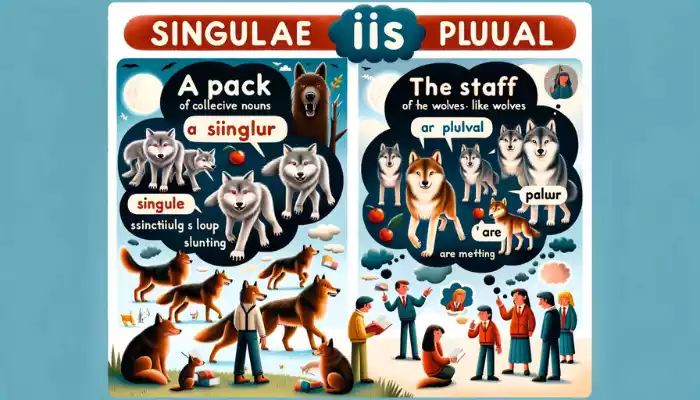Collective Nouns Singular or Plural: A collective noun refers to a group of people, animals, or things. For example, some common collective nouns are “team,” “family,” “crowd,” “flock,” and “pack.” Unlike regular nouns, collective nouns can be considered either singular or plural depending on the context.
Definition of Collective Nouns
Collective nouns function as a unit, representing a group as a whole. Even though they reference multiple people or items, we can use them as single or plural nouns. For example, we can say “The team is celebrating their victory” or “The team are celebrating their victory.” Both are correct.
Some common examples of collective nouns used in everyday language are:
- Class
- Jury
- Committee
- Audience
- Orchestra
- Company
Historical Background
Collective nouns originated in the Middle Ages as terms used in hunting and farming to describe groups of animals. For example, terms like “flock,” “herd,” and “school” emerged to identify animal groups.
Over time, collective noun usage expanded to also describe groups of people – for example, family, team, group, etc. Their flexibility as either singular or plural took hold during the rise of British prescriptivism in the 17th and 18th centuries. Since then, collective nouns have continued to widely serve an important function in the English language.
To learn more about collective nouns and their origins, check out Evolution of Collective Nouns on some intriguing collective noun examples like a “glittering of goldfish” and a “parliament of owls! Understanding collective noun distinctions can help strengthen your writing.
Collective Nouns Singular or Plural Usage
When using collective nouns in writing and speech, deciding between singular and plural forms can be tricky. Here’s an overview of when to use each:
General Rules for Singular and Plural Forms
We treat a collective noun as singular when the group is acting as a cohesive, singular unit. For example:
- The team is training for their next match.
- My family Values quality time together.
We use plural verbs when the individuals in the group are acting separately or independently:
- The cattle are grazing in the pasture.
- The committee disagree on the best solution.
Differences in British and American English
British and American English have slight variations when it comes to collective nouns:
- British English tends to use the plural form more often when referencing groups. For example: “Arsenal have won the match.”
- American English generally favors the singular form for collective nouns. For example: “My family is arriving tomorrow.”
However, both forms are generally considered correct across dialects.
Special Cases and Exceptions
Some collective nouns are almost always singular, like “United States” and “police.” For example:
- The United States is a large country.
- The police has issued a statement.
Exceptions arise in casual speech, but formal writing typically adheres to consistent singular or plural forms for certain nouns.
Practical Tips and Common Mistakes
Using collective nouns properly can be challenging. Here are some guidelines to help:
Guidelines for Using Collective Nouns Correctly
To determine whether a collective noun should be singular or plural:
- Identify whether the group is acting as a unit or as individuals.
- Check that the subject and verb agree in number.
For example:
- The flock flies in a V-formation. (singular – acting as unit)
- The audience applaud the speaker. (plural – individuals clapping)
Common Errors and How to Avoid Them
Common collective noun mistakes include:
- Assuming all collective nouns are always singular or plural. Instead, consider the context.
- Using the wrong verb form, leading to subject-verb disagreement. Double check alignments.
- Confusing collective nouns like “staff” and “faculty.” Verify definitions before use.
Stylistic Considerations in Writing
Collective nouns can enhance writing style:
- Using diverse, precise collective terms can add formality and sophistication. For example, prefer “fleet” over “group of ships.”
- Collective nouns can strengthen descriptive impact when used skillfully, like an “intimidation of critics.
- Be consistent in number for a given collective noun throughout a piece for clarity. Varying between singular/plural forms can confuse.
In conclusion, apply these tips when writing with collective nouns to boost precision and eloquence. Let me know if you have any other collective noun usage questions!
FAQ
1. Can a collective noun be both singular and plural in the same sentence?
A: Yes, a collective noun can be both singular and plural in the same sentence through clarifying context.
2. How does context influence the use of collective nouns in singular or plural form?
A: Context like prepositional phrases or whether individual group members act separately guides singular or plural collective noun usage.
3. Are there any collective nouns that are always plural?
A: Some collective nouns like “police” or “clergy” are always plural.
4. How do collective nouns interact with possessive forms?
A: Collective nouns take singular possessive forms when acting as a unit, and plural possessive forms when referencing individual group members.
5. What are some creative or unusual collective nouns?
A: Creative collective nouns include terms like “a murder of crows,” “a glaring of cats,” “a prickle of porcupines,” etc.
Imagine having a personal tutor available 24/7. Chat GPT Deutsch offers instant access to information, helping students understand complex topics with ease. It answers questions quickly, making study sessions more productive.
Researchers can use Chat GPT Deutsch to sift through large data sets efficiently. It provides summaries and insights that save time and improve focus. This tool also fosters collaboration by generating ideas and suggesting research directions.

